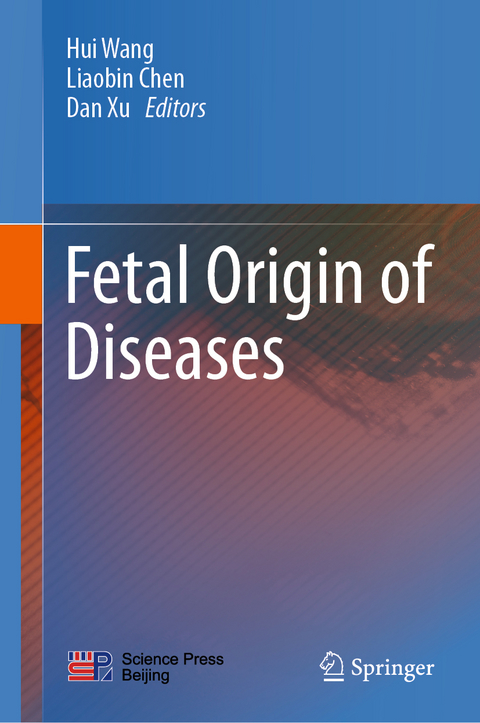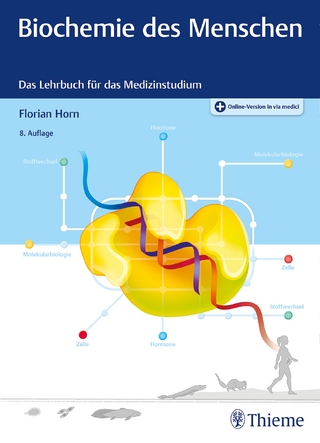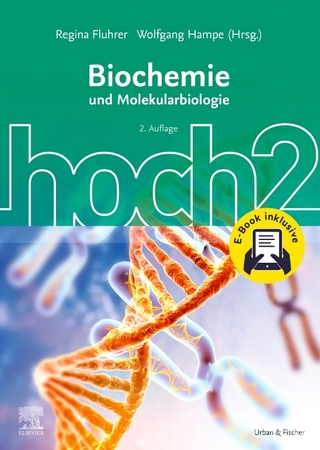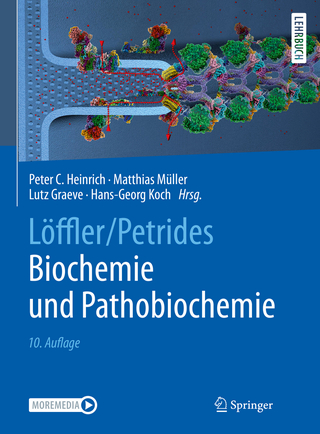
Fetal Origin of Diseases
Springer Nature (Verlag)
978-981-97-5729-9 (ISBN)
- Titel nicht im Sortiment
- Artikel merken
This book covers two decades of the author's studies about fetal-originated diseases. It contains researches from the aspects of multiple inducing factors of fetal-originated diseases, including prenatal xenobiotic exposure, nutritional deficiency and other adverse environment during pregnancy. The authors introduce a series of animal models for studying the fetal origin of a variety of metabolic and neuropsychiatric diseases, and propose the mechanisms of developmental toxicity and susceptibility to multiple diseases, such as glucocorticoid programming. Moreover, the extended knowledge are also clearly addressed, like identification of biomarkers of developmental toxicity, and the strategies for early warning, prevention and treatment of fetal-originated diseases. Thus, the book is a systematic and complete reference for the researchers of related areas.
WANG Hui holds the prestigious position of professor of Pharmacology, Wuhan University. She is celebrated as the “LUOJIA Distinguished Scholar” at Wuhan University, and the leading scientist of the National Key R&D Program. In her current role, she steers the Hubei Provincial Key Laboratory for Developmentally Originated Diseases and shines as a distinguished professor at the Women’s and Children’s Hospital, affiliated with Zhongnan Hospital of Wuhan University, and an adjunct professor, Peking University Health Science Center. Her leadership extends beyond academia into influential roles in professional societies: she holds vice-chairmanships in the Biochemical and Molecular Pharmacology Committee of the Chinese Pharmacological Society, the Reproductive Toxicology Committee of the Chinese Society of Toxicology, as well as the Environmental and Developmental Diseases Committee of the Chinese Society of Environmental Mutagens. She primarily engaged in the research of developmental toxicology of xenobiotics and prevention strategies for fetal-originated diseases. Her academic achievements mainly include: the creation of various animal models for intrauterine growth retardation, systematically elucidating the programming mechanisms of the thrifty phenotype; a two-step method to establish various animal and cell models of fetal-originated diseases, systematically elucidating their intrauterine programming mechanism; the development of an original innovative theory on maternal glucocorticoid programming offspring’s susceptibility to multiple diseases; and the construction of early comprehensive prevention strategies for fetal-originated diseases based on the glucocorticoid programming theory. She led over 50 research projects, including key special projects of the National Key R&D Program, 5 key projects of the Natural Science Foundation of China, and major scientific research projects of the Ministry of Education. She published over 300 SCI papers in multidisciplinary mainstream journals such as Cell Reports Medicine, Acta Pharmaceutica Sinica B, Advanced Science, Journal of Advance Research, and Science of The Total Environment, and Metabolism. The Comparative Toxicogenomics Database (CTD) lists 82 of her research findings on toxic action targets/pathways. . She holds 17 authorized national invention patents, of which 3 have been transferred, and published academic monographs “Fetal-Originated Diseases” and “The Fetal Origin of Bone and Joint Diseases”. Her scientific research achievements have won several awards, including the First Prize in Natural Science of National Maternal and Child Health, the First Prize in Scientific and Technological Progress of Hubei Province, and the Second Prize in Scientific and Technological Achievements of the China Birth Defects Intervention and Rescue Foundation. CHEN Liaobin is a professor and consultant surgeon at Zhongnan Hospital of Wuhan University. Currently, he serves as the head of the Department of Orthopedic Teaching and Research, the director of the Division of Joint Surgery and Sports Medicine, and the director of the Joint Disease Research Center at Wuhan University. In the academic realm, he holds prestigious positions such as the vice president of the International Cartilage Repair Society China Division (ICRS-China), the deputy leader of the Lower Limb Group under the Sports Medicine Branch of the Chinese Medical Association, the standing committee member of the Sports Medicine Branch of the Chinese Medical Doctor Association and the head of the Basic and Translational Medicine Group , the deputy head of the Osteoarthritis Study Group of the Chinese Medical Doctor Association, the director of the Hubei Provincial Base of Arthroscopy Training Institute under the Chinese Medical Doctor Association, and the chairman of the Sports Medicine Branch of the Hubei Medical Association. Beyond his foundational and clinical research work in orthopedics, Prof. Chen primarily focuses on the “mechanisms and prevention of fetal-originated bone and joint diseases.” He has led one key project and five general projects of the Natural Science Foundation of China, served as the PI for one major sub-project under the National Key R&D Program, led one major project of the Hubei Provincial Key R&D Program, and one key project of the Hubei Provincial Natural Science Foundation. To date, he has published 155 SCI papers in multidisciplinary mainstream journals including Acta Pharmaceutica Sinica B, Journal of Advanced Research, Stem Cell Research and Therapy, Arthroscopy, The American Journal of Sports Medicine, and Bone and Joint Journal; he holds eight national invention patents and one new practical patent. As for research achievements, he won the first prize of Hubei Province Science and Technology Progress in 2016, 2018 and the third prize of Chinese Medical Science and Technology in 2017, as well as the First Prize of National Maternal and Child Health Natural Science in 2019. He is the chief editor of academic monographs “The Fetal Origin of Bone and Joint Diseases” and “Dislocation after Total Hip Arthroplasty: the Causes and Management.” XU Dan is a professor and doctoral advisor at the School of Pharmaceutical Sciences, Wuhan University, where she leads the discipline of pharmacology. She has earned numerous prestigious accolades, including National Excellent Young Scientist, Hubei Province Outstanding Young Scientist, and the "LUOJIA Young Scholar" title at Wuhan University. Xu holds several influential positions in academic circles, serving as the Chair of the Young Committee of the Chinese Pharmacological Society’s Division of Analytical Pharmacology, Executive Committee Member of the Youth Committee of the Chinese Society of Toxicology, Executive Committee Member of the Committee on Environmental and Developmental Origin Diseases of the Chinese Society of Environmental Mutagens, and Vice President of the Wuhan Pharmacological Society. Her research primarily explores the developmental toxicology of xenobiotics, with a special focus on intrauterine programming mechanisms and the prevention of fetal-originated neuropsychiatric disorders induced by these xenobiotics. Xu has spearheaded five projects under the National Natural Science Foundation of China, including the Excellent Young Scientists Fund Project, General Program, and Youth Program. She has been instrumental in a major national key R&D program investigating developmental programming and its metabolic regulation. As the first author or corresponding author, Xu has published over 50 research articles, with 90% appearing in JCR Q1/Q2 ranked SCI journals, in leading multidisciplinary publications such as Microbiome, Acta Pharmaceutica Sinica B, BMC Medicine, and Pharmacological Research. The Comparative Toxicogenomics Database cites 22 of her studies on toxic action targets and pathways, and two of her theories have been incorporated into academic textbooks. She holds six national invention patents. Xu's contributions to pharmacology have been acknowledged with several awards, including the Young Pharmacologist Award from the Chinese Pharmacological Society, the Outstanding Young Scientist Award from the Chinese Society of Toxicology, and the Outstanding Young Award from the Teratology Committee of the Chinese Society of Environmental Mutagens. Additionally, she has received the First Prize in Scientific and Technological Progress from Hubei Province, the First Prize in Natural Science for National Maternal and Child Health, and the Second Prize in Scientific and Technological Achievement from the China Birth Defects Intervention and Rescue Foundation, among other honors.
Chapter 1. Prenatal Adverse Environment and Susceptibility to Fetal-originated Disease.- Chapter 2. Molecular Mechanism of Fetal Developmental Toxicity.- Chapter 3. Epigenetic Mechanism of Fetal-originated Disease.- Chapter 4. Neuroendocrine Programming Mechanism of Fetal-originated Disease.- Chapter 5. Glucocorticoids Programming Mechanism of Fetal-originated Disease.- Chapter 6. Gut Microbiota Mechanism of Fetal-originated Disease.- Chapter 7. Sex Difference of Fetal-originated Disease.- Chapter 8. Multigenerational Genetic Effect of Fetal-originated Disease.- Chapter 9. Developmental Toxicity of Caffeine and Related Fetal-originated Disease.- Chapter 10. Developmental Toxicity of Dexamethasone and Related Fetal-originated Disease.- Chapter 11. Fetal Origin of Metabolic Syndrome.- Chapter 12. Fetal Origin of Diabetes.- Chapter 13. Fetal Origin of Non-alcoholic Fatty Liver Disease.- Chapter 14. Fetal Origin of Hypercholesterolemia.- Chapter 15. Fetal Origin of Osteoporosis.- Chapter 16. Fetal Origin of Osteoarthritis.- Chapter 17. Fetal Origin of Glomerulosclerosis.- Chapter 18. Fetal Origin of Epilepsy.- Chapter 19. Fetal Origin of Testicular Dysplasia.- Chapter 20. Fetal Origin of Premature Ovarian Insufficiency.- Chapter 21. Methods of In vivo and In vitro Study of Fetal-originated Disease.- Chapter 22. Targets for Early Warning and Drug Intervention for Fetal-originated Disease.
| Erscheint lt. Verlag | 2.12.2024 |
|---|---|
| Zusatzinfo | 4 Illustrations, color; 43 Illustrations, black and white; Approx. 350 p. |
| Verlagsort | Singapore |
| Sprache | englisch |
| Maße | 155 x 235 mm |
| Themenwelt | Medizin / Pharmazie ► Medizinische Fachgebiete |
| Studium ► 1. Studienabschnitt (Vorklinik) ► Biochemie / Molekularbiologie | |
| Naturwissenschaften ► Biologie ► Biochemie | |
| Naturwissenschaften ► Biologie ► Genetik / Molekularbiologie | |
| Schlagworte | Development programming • Fetus-originated diseases • Glucocorticoid • Intrauterine growth retardation • Prenatal adverse environment |
| ISBN-10 | 981-97-5729-0 / 9819757290 |
| ISBN-13 | 978-981-97-5729-9 / 9789819757299 |
| Zustand | Neuware |
| Haben Sie eine Frage zum Produkt? |
aus dem Bereich


